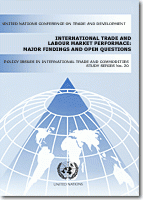
The wage and employment conditions of unskilled workers in many developed countries have deteriorated during the last couple of decades. Depending on which countries are considered, this tendency may show up either as a reduction in employment perspectives for unskilled workers (continental Europe) or as a reduction in their relatives, and even absolute, earnings (United States). During the same period, the labour markets in developing countries have been showing opposite tendencies, depending on the geographical aggregates considered. While disguised unemployment and wage inequality have been falling in many Asian countries, labour market conditions have been sluggish in Latin America, and inequalities have been increasing.
This paper surveys the findings arising from existing research into the effects of trade on labour demands, and to identify some open questions and directions for further research. Three paths are identified as particularly promising. First, an effort should be made to relate labour market variables directly to trade policy measures. Second, the links between trade and thee labour market should be addressed from a consistent cross-country perspective. Third, the role of labour market institutions and production internationalization (outsourcing, international exchange of intermediate inputs, foreign direct investment) should be further explored.
The next section summarizes some basic facts about world trends in trade integration, employment and wage inequality. Section III illustrates the explanations commonly offered by labour and trade economists to account for the effects of trade on employment and wage dynamics, and assess the findings of empirical research on that issue. Section IV identifies some open questions and paths for further research. Section V concludes.


